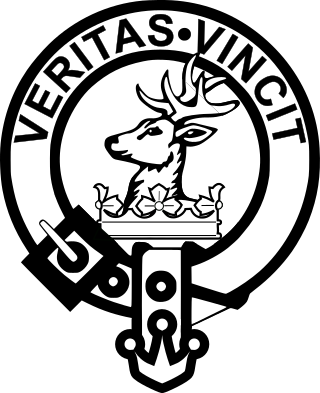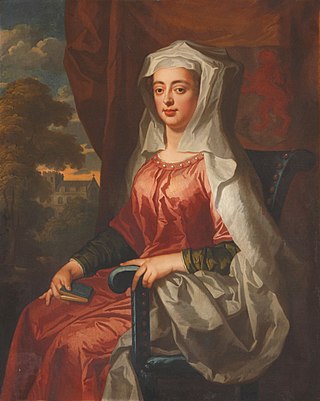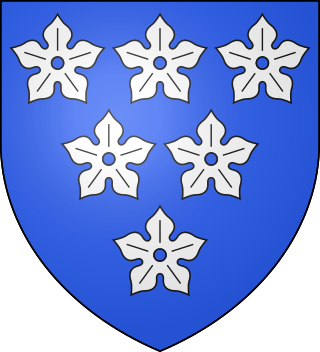Related Research Articles

Clan Keith is a Highland and Lowland Scottish clan, whose Chief historically held the hereditary title of Marischal, then Great Marischal, then Earl Marischal of Scotland.

The title of Earl Marischal was created in the Peerage of Scotland for William Keith, the Great Marischal of Scotland.

Dervorguilla of Galloway was a "lady of substance" in 13th century Scotland, the wife from 1223 of John de Balliol and mother of John I, a future king of Scotland.

Sir John Keith, 1st Earl of Kintore PC (Scot), was a Scottish nobleman.

William Comyn was Lord of Badenoch and Earl of Buchan. He was one of the seven children of Richard Comyn, Justiciar of Lothian, and Hextilda of Tynedale. He was born in Scotland, in Altyre, Moray in 1163 and died in Buchan in 1233 where he is buried in Deer Abbey.

Alexander Comyn, 2nd Earl of Buchan was a Scoto-Norman magnate who was one of the most important figures in the 13th century Kingdom of Scotland. He was the son of William Comyn, Lord of Badenoch, and Marjory, Countess of Buchan, the heiress of the last native Scottish Mormaer of Buchan, Fergus. He was the chief counsellor of Alexander III, King of Alba (Scotland) for the entire period of the king's majority and as Scotland's leading magnate, played a key role in safeguarding the independence of the Scottish monarchy. During his long career, Alexander Comyn was Justiciar of Scotia (1258–1289), Constable of Scotland (1275–1289), Sheriff of Wigtown (1263–1266), Sheriff of Dingwall (1264–1266), Baillie of Inverie and finally, Guardian of Scotland (1286–1289) during the first interregnum following the death of Alexander III. In 1284 he joined with other Scottish noblemen who acknowledged Margaret of Norway as the heiress to King Alexander. He died sometime after 10 July 1289.
John Comyn (Cumyn) was Lord of Badenoch in Scotland. He was Justiciar of Galloway in 1258. He held lands in Nithsdale and Tynedale.

Sir Robert Keith was a Scottish knight, diplomat, and hereditary Marischal of Scotland who commanded forces loyal to Robert Bruce at the Battle of Bannockburn.

Sir Robert Keith was a Scottish nobleman and a hereditary Great Marischal of Scotland.

George Keith, 5th Earl Marischal (c. 1553–1623) was a Scottish nobleman and Earl Marischal. He succeeded as earl on 7 October 1581, upon the death of his grandfather, William Keith, 4th Earl Marischal.

Alexander Fraser of Touchfraser and Cowie was a member of the Scottish nobility who served as the Lord Chamberlain of Scotland and also as the Sheriff of Stirling and Sheriff of Kincardine. He was a descendant of the Clan Fraser members deriving from Oliver Castle. Alexander died at the Battle of Dupplin Moor.
William Keith, 6th Earl Marischal was a Scottish lord, Earl Marischal and naval official.
Alice Comyn, Countess of Buchan, Lady Beaumont was a Scottish noblewoman, a member of the powerful Comyn family which supported the Balliols, claimants to the disputed Scottish throne against their rivals, the Bruces. She was the niece of John Comyn, Earl of Buchan, to whom she was also heiress, and after his death the Earldom of Buchan was successfully claimed by her husband Henry de Beaumont, Earl of Buchan, by right of his wife. His long struggle to claim her Earldom of Buchan was one of the causes of the Second War of Scottish Independence.

William Keith, 4th Earl Marischal was a Scottish nobleman and politician.

Sir Edward Keith was a Scottish nobleman and hereditary 11th Marischal of Scotland.
The Sheriff of Aberdeen was a royal official who was responsible for enforcing justice in Aberdeenshire, Scotland. Prior to 1748 most sheriffdoms were held on a hereditary basis. From that date, following the Jacobite uprising of 1745, they were replaced by salaried sheriff-deputies, qualified advocates who were members of the Scottish Bar.
Sir Francis le Chen or Cheyne of Straloch was a 14th-century Scottish noble.

William Keith, 2nd Earl of Kintore, was a Scottish nobleman.

Sir James (de) Lindsay, 9th Lord of Crawford, Knight Banneret, Lord of Crawford, Kirkmichael, Wigton, Symontoun, and of many other baronies, claiming also to be Lord of Buchan, was a Scottish feudal lord.
Events from the 1270s in the Kingdom of Scotland.
References
- Balfour Paul, Sir James-The Scots Peerage Vol. VI. Edinburgh, 1909.